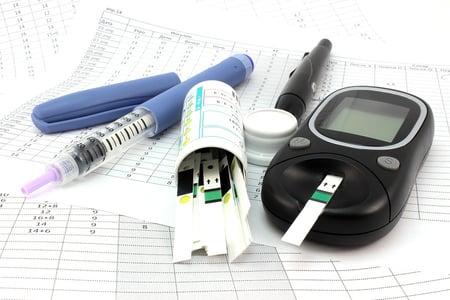More than a quarter of people aged 65 and older -- approximately 11.8 million senior Americans -- have diabetes, according to the American Diabetes Association. For the majority of them, insulin injections are a critical tool for treating the disease. If you're a caregiver for a senior with diabetes, do you understand what insulin is and how it works? Let's take a closer look.

While adjusting to life with diabetes involves an adjustment period, caregivers play a vital role.
What Is Insulin?
Every time we eat something, the digestive tract transforms carbohydrates into glucose -- a critical energy source which sustains all of the body's cells and organisms. Produced in the pancreas, the hormone insulin plays two important roles in the human endocrine system: it fosters the body's use of glucose as energy while also helping to regulate blood glucose levels.
Diabetes occurs when the body doesn't produce enough insulin or uses it improperly; this leads to a loss in the ability to maintain healthy blood sugar levels. Keeping glucose levels in a healthy range is a critical part of lowering the risk of life-threatening diabetes complications.
Types of Insulin
Insulin is delivered via injection, "pen," or pump. There are several different types of insulin which vary according to duration of effect and speed of onset. Rapid-action insulin is taken before a meal and can begin work in as little as 30 minutes with a lasting time of up to eight hours, while long-acting insulin takes up to an hour to start working, but can last for more than 24 hours.
Your aging loved one's physician will work with you to determine which type of insulin is best for your aging loved one's needs.
Insulin Injections
If you are caring for a senior who requires insulin injections, his healthcare team should provide you with thorough instructions regarding how, where and when to administer injections. The abdomen and thigh are common injection locations, although it's best to vary the injection site to avoid the thickening of the skin.

Routine monitoring of blood sugar levels is essential to preventing insulin reactions.
As treatment ranges from patient to patient -- and depends on a number of individual factors including everything from level of physical activity to diet -- it's important to maintain open lines of communication with the healthcare team. Some people require as many as four insulin shots a day, while others may need just one.
Keep in mind that insulin reacts to changes in temperature, so avoid placing it in direct sunlight or freezing it. Following general storage guidelines can help ensure that insulin does not expire.
Insulin Reactions
When insulin levels are not in balance with food intake, insulin reactions can occur. An excess of insulin can lead to hypoglycemia (AKA "insulin shock"). This can be triggered by anything from a missed meal to over-exercising. It can also occur through human error; for example, if too much insulin is injected. Most insulin reactions can be reversed by the ingestion of a fast-acting carbohydrate, such as fruit juice, candy or soda.
Signs and symptoms of insulin reaction include dizziness, hunger, irritability, shakiness, rapid heartbeat, and sweating. Without treatment, mild symptoms can progress to confusion, headache and lack of coordination, and later to unconsciousness, seizures, coma, and even death.
While insulin reactions are fairly common -- particularly during the post-diagnosis adjustment period -- they still require medical intervention in cases where the patient remains confused after correcting the hypoglycemia.
Not taking enough insulin can also lead to long-term health complications, including kidney failure, blindness, and nerve damage.
While helping an aging loved one manage diabetes is a significant undertaking, caregivers who learn all they can about insulin and its vital role in regulating blood glucose levels can help safeguard the ongoing health and wellness of their loved ones. Mmlearn.org offers a large library of free videos for caregivers of older adults, covering topics pertaining to senior care. Whether you are a healthcare professional or a family caregiver, if you are caring for an older adult we know that you will find mmlearn.org an essential learning and guidance tool for all of your caregiver training needs.

